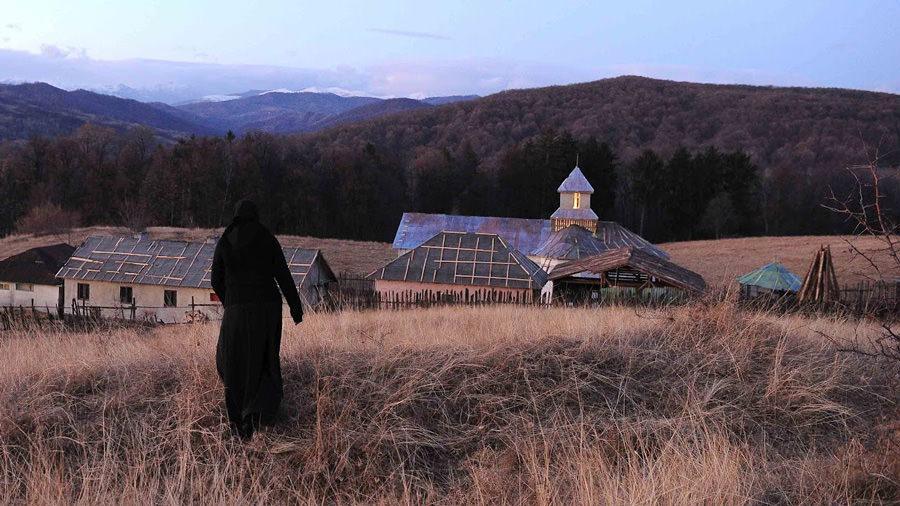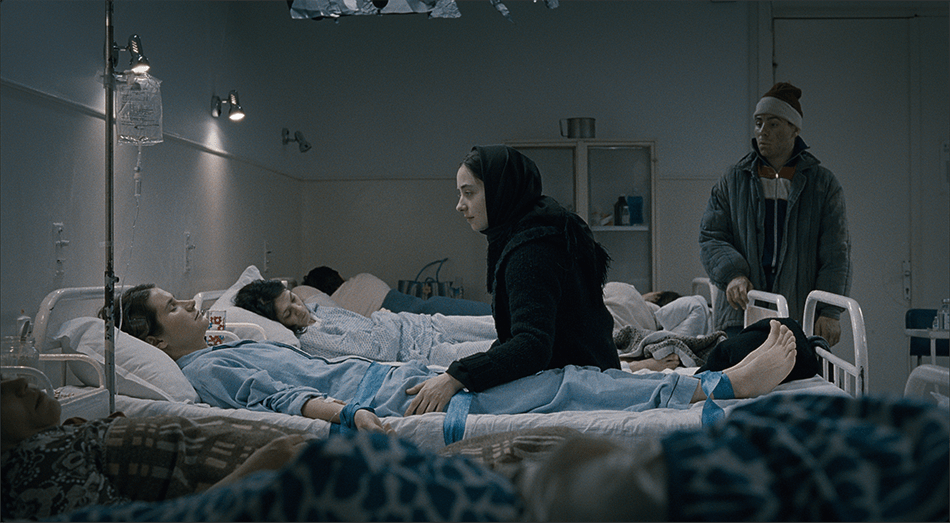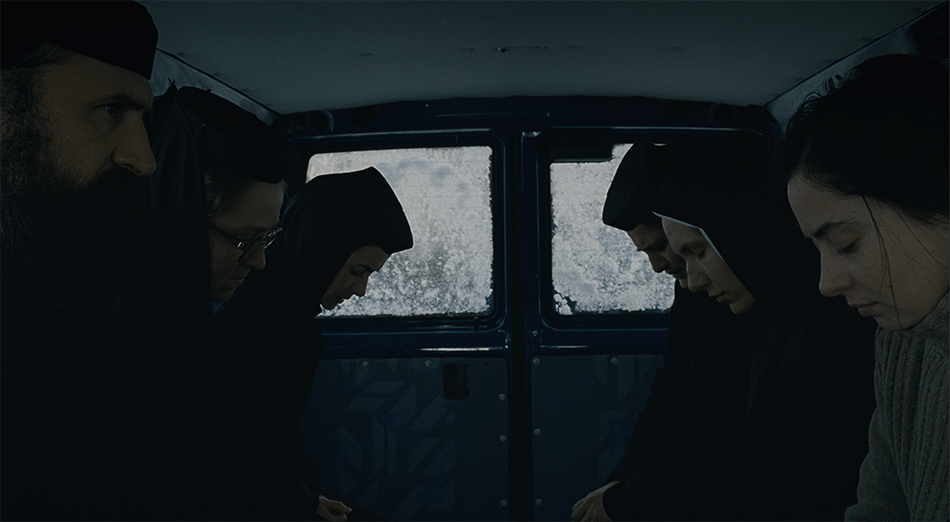The Romanian director Cristian Mungiu’s latest movie is about a young woman who is tortured to death with the highest intentions. That, at any rate, is one way to describe the story of Beyond the Hills, which is loosely based on an event that took place at an Orthodox monastery in Moldavia in 2005. The woman’s death was the result of a ritual exorcism, not uncommon in Romania, meant to save her soul from the devil.
In lesser hands than Mungiu’s, the film might have become a simple indictment of religious orthodoxy, a criminal priest, and a bunch of nuns deluded by medieval bigotry in the remote countryside. But that would have been a rather obvious approach. The story told by Mungiu, one of the best contemporary directors in Europe, is more complicated, and interesting.
Like his celebrated and equally harrowing earlier movie, 4 Months, 3 Weeks and 2 Days (2007), about an illegal abortion in the last years of Ceauşescu’s Romania, Beyond the Hills revolves around the intense relationship between two troubled young women. Voichita (Cosmina Stratan) and Alina (Cristina Flutur) grew up together in an orphanage. Their parents had abandoned them or were dead.
Voichita tries to find sollace in religious faith at a monastery, in the arms of God and the surrogate family of nuns and a charismatic priest. Alina leaves for Germany, where she works as a waitress, but finds that she cannot live without her friend. Her love for Voichita is total, in body and spirit. She is dependent on her. Without her, life is unbearable. Voichita loves her friend too, but she loves God even more, or so she thinks, and the two forms of love are not compatible.
If the danger of dependence—on a lover, on God—is one theme of the movie, the danger of indifference is another. Alina collapses in a fit of hysteria, a condition that will come and go in ever more violent forms as the story unfolds. The treatment she receives at a hospital is frigidly professional: she is tied to a bed and pumped full of drugs to subdue her fits of frenzy. A doctor, aware of the limitations of this type of treatment, advises her to stay with her friend for a while. The scriptures, he believes, might do her good in ways that drugs never can. He is the only bridge between the two worlds of the story—the secular and the religious, the hospital and the monastery.
In fact, this is no solution at all. The priest and the nuns, secure in their isolation from the sinful society around them, see Alina as a threat, an unbeliever in their midst, a potential sower of doubts. For Alina, the rivalry with God for the affections of her only friend, who refuses any physical intimacy with her, quickly becomes acute. Despite her unbelief, Alina is so desperate for the love of Voichita that she even tries to enlist religious magic. An icon, hidden inside the chapel, is supposed to have great powers—like the priest himself, who the nuns believe can heal illnesses through the force of his prayers.
Caught trying to find the secret icon in the chapel, Alina sets off a kind of hysteria at the monastery that echoes her own: the nuns scream and wail, the priest threatens all kinds of punishments. Alina must leave. Her presence is intolerable. Faced with losing Voichita, Alina becomes hysterical once more and unleashes all her fury on the church, on the icon, on the priest and the nuns.
Voichita manages to convince the priest to let her friend stay a bit longer: Alina has nowhere else to go.
And the nuns, who are compassionate people, agree. But their compassion—and this is the brilliance of Mungiu’s concept—is precisely what leads to disaster. They are convinced that Voichita is a victim of Satan. They believe their greatest obligation is to do everything in their power to release Voichita’s soul from the clutches of the devil.
And so, in another echo of the earlier scenes in the hospital, Alina, frothing and flailing in a violent fit, is strapped to a wooden plank, and kept that way for days and nights as the priest struggles with the devil in endless rituals of exorcism. At night she is locked up in a freezing cell. Her screams are interpreted as the screams of Satan. The nuns are convinced that she is grateful for their ministrations. She knows that they are doing her a great kindness in saving her soul. Finally, cold, exhausted, famished, broken, Alina looks up at her friend for one last time, smiles faintly, and dies.
Advertisement
The agents of the secular outside world, usually kept at bay, now intrude into the peace of the monastery. A woman doctor is furious at the nuns for having let this happen. The police arrive to investigate what seems like a case of murder. The priest and his senior nuns, including, at her own request, the shattered Voichita, are driven away in a police van to face the consequences of their acts in a provincial court.
What makes the story tragic, instead of merely sad and sordid, is the way Mungiu shows the two realities, the secular and the Orthodox, colliding. The filmmaker does not sit in judgment of his characters. The man and women responsible for Alina’s death are not bad people. Indeed, the behavior of the woman doctor and the cops, who seem to regard Alina as just another corpse, or case, is much more callous. Their attitude is fed not by malice, but by indifference. This is a theme of Mungiu’s earlier films, too: the cold lack of concern for the fate of others made worse by the petty officiousness of communist society under Ceauşescu. Everyone looks out for him or herself; nobody cares, not the abortionist in 4 Months, 3 Weeks and 2 Days, who demands sexual favors for his illegal deed, not the corrupt officials, not the parents who abandon their children, not the nurses and doctors, not even the waiters in restaurants who would much rather say that items on the menu are unavailable than serve a decent meal.
The convent is indifferent in another way. Almost entirely sealed off from mainstream society, it is a closed community wrapped up in itself. Devotion to God, and to life in its narrow confines, trumps all other human needs, such as the love of one person for another. This leads to an extreme kind of obtuseness. The priest and the nuns are genuinely baffled by accusations that they did anything wrong. How can it be wrong to save a young woman’s soul? What can be wrong about praying and fighting the devil? Yes, she had to be strapped to a wooden bed, for her own good, to stop her from harming herself and others, while Satan had her in his power.
But at least, in their eyes, they had cared for Alina. Was it any better for her to be strapped to her hospital bed and drugged into a stupor?
There is a kind of logic to this question, even if religious mania is hardly a solution. Mungiu is careful to show the attractions of monastic retreat from an often ugly and pitiless world. The monastery is extremely simple, so simple and unadorned that the local bishop refuses to consecrate the chapel until it is properly painted and decorated; the bishop, too, is really part of the secular world. But the monastery has a stark, quiet beauty, as does the countryside in which it is set.
The last scene of the movie shows us the inside of the police van, stalling at a traffic light. The priest reassures the anxious nuns that they have nothing to fear, as God is with them. One of the cops amuses his colleague with a lurid story of a recent murder case. Outside it is raining, and a giant drill makes a horrible racket breaking up the road. Honking cars pass by concrete apartment buildings. A heavy truck pulls up at the light and splashes the windscreen with a filthy black smear of muddy rainwater.
Beyond the Hills, a film directed by Cristian Munghiu, is showing at New York’s Lincoln Plaza Cinemas and IFC Center through March 24.





